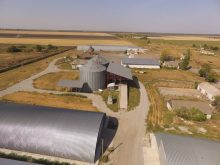Russia’s recent decision to terminate the Black Sea grain agreement that allowed tonnes of Ukrainian grain to be shipped to 45 nations, has raised concerns over global food security.
As the war between Russia and Ukraine rages, nearly half of Ukraine’s food exports, which are mainly directed toward developing nations, could be adversely affected.
Despite Russia’s existing memorandum of understanding with the UN for exporting its fertilizer and grain without sanctions, the termination of the grain deal could have far-reaching consequences for the global food landscape.
Read Also

Farm equipment market unlikely to pick up
North America’s farm machinery sales have been slow and uncertain thanks to tariffs and trade disruption. There’s not a lot of hope for change in 2026.
As the grain deal’s renewal approached earlier this month, Russia expressed its discontent with the agreement. That grumbling was not new. However, for the first time, President Vladimir Putin explicitly declared the deal’s termination, leading to widespread uncertainty.
The prices of corn and wheat futures surged, posing challenges to food markets like Canada, as Ukraine is responsible for a substantial share of global exports in those crops. Although rail shipments remain an option, the efficiency of Black Sea transport is unparalleled in the region.
Ukraine’s significance in the global food market cannot be understated. Prior to the war, its food exports had the capacity to feed 400 million people, surpassing the entire population of the United States. The country’s farmers contributed one-tenth of the world’s wheat and nearly half of the globally sold sunflower oil.
The repercussions of any disruption in this region resonate across the world, much like what would happen if Canada faced invasion.
The Black Sea grain deal played a pivotal role in easing concerns about food security and potential famine. This deal averted a more dire situation, with food prices having soared at grocery stores just 12 months ago due to inflationary pressures caused by the ongoing war.
The UN Food and Agriculture Organization’s cereal price index, which stood at 147.3 months after the conflict’s start, experienced a 14 per cent decrease in June, reaching 126.6. Similarly, the overall food price index saw a notable drop of nearly 12 per cent, from 140.6 to 122.3, during the same period, largely attributed to the Black Sea grain deal.
The Kremlin’s shift in tone regarding the deal likely reflects how the war is progressing. In an apparent attempt to utilize all means necessary to further its cause, Russia seems to be weaponizing hunger, a historically effective tactic to inflict suffering upon populations.
The world has witnessed the dark side of food geopolitics throughout history and, unfortunately, it seems that history may repeat itself.
The termination of the Black Sea grain deal threatens global food security and stability. The international community must mobilize and rally to extend the agreement to prevent dire consequences.
This situation serves as a stark reminder of Russia’s significant influence and power in shaping the global food security agenda. It is essential to recognize and address such challenges to counter the potential evil that exists on Earth.
As the world faces these issues, the gravity of ensuring food security for all nations becomes ever more apparent.
– Sylvain Charlebois is professor of food distribution and policy at Dalhousie University and senior director of the AgriFood Analytics Lab.















